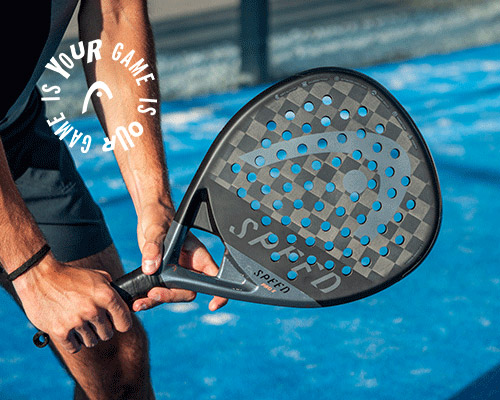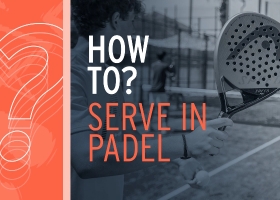Padel tactics to improve your game
Easy-to-follow tips that will help you to win more matches
One of the joys of padel is that it's easy to pick up. When you're new to the sport, you'll instantly be able to hit the ball and have some fun with your friends. But, as you play more and improve your technique, you'll find yourself thinking more about how to use those skills. Here's our guide to tactics that will help you to improve your game, feel more in control and, most importantly of all, win more matches and have even more fun on court.
Consistency usually beats power
What’s the best way to be hitting the ball in padel? Everyone likes to smack powerful, spectacular winners. But trying to hit opponents off the court isn’t always the best idea. Playing more consistently - getting more balls back into the court and forcing your opponents to make mistakes - is ultimately going to win you more matches. Often it will be the team that shows greater consistency, and which therefore makes fewer errors, which goes on to win. Perhaps right now you're always looking to shorten the points and you're a risk taker. You might want to change your mindset - you should instead try to become more patient and to be as consistent as possible. This is when your technique becomes even more important – if consistency is your aim, you can't have any major flaws in your game which are going to frequently produce errors.
Build your confidence from the back of the court
Playing a more measured, consistent game - taking your time and not rushing your shots or desperately trying to shorten a point - will help you to build your confidence and allow you to stay cool, composed and in control. That's particularly important in the early stages of a match when you're trying to figure out how your opponents like to play. Early on, you could look to stay at the back of the court, playing with control and consistency. That will allow you to hit more shots and find your rhythm while giving you more of an opportunity to work out which tactics to use against your opponents. While it's easier to finish off points from the net, that doesn't mean you should be getting over-excited and coming forward after hitting your return. It's far better to wait for a strong opportunity so be selective about when you move to net.
Take control at the net
When you do move to net, don't imagine you have to finish off every point with a powerful volley winner as that is a riskier shot. Instead hit your volleys with more control.
Is padel physically demanding?
You can use a lot of energy - both physical and mental - when playing padel. That's especially true if you are rushing to net at every half-chance - you'll be running forward and then maybe dashing back when you're lobbed only to then potentially sprint back to net again. But if you're able to play with greater control and consistency, and perhaps you stay back until the opportunity is right, you won't use so much physical energy. A more measured approach will also avoid the sudden rushes of excitement and adrenaline that can be brought on by playing a risky type of padel; you will feel calmer, giving yourself the mental clarity to play the right shot.
Padel tactics for beginners
Target your opponents’ weaknesses
In the beginning of the match, try to identify what their weaknesses are (because every player, however good they are, will have a weakness). Play a variety of different shots and see what they like and don't like. You will probably find that their backhands are weaker than their forehands - that's the case with most players.
Focus on one player
If you constantly play the ball at one opponent - and it doesn't necessarily have to be the weaker of the two - that's going to have two effects. The player you're targeting is going to feel under greater pressure as they won't want to let their partner down. At the same time, the partner who's not hitting any shots - who is said to have been put in 'the fridge' - will become increasingly frustrated that they're not properly involved in the match. And then, when a shot finally comes their way, there's a chance that they will have lost some of their touch and rhythm; after all that time in the 'fridge', their game will have gone cold.
Speed up or slow down - don't become predictable
Introduce some variety as that stops opponents from getting comfortable. Suddenly playing a slower shot can throw opponents off their rhythm. Or you could suddenly speed things up and hit a shot with extra pace as then they will be rushed. Mixing up the speed of your shots is a great way of becoming less predictable. Another is changing where you hit the ball, including the placement of your serve, as that will keep opponents guessing.
Move them around
If you can move your opponents around the court, they will be rushed when playing their shots, which could lead to a mistake. As the match continues, they will also start to get tired and that physical and mental fatigue could also result in more errors from their side of the net.
Hit down the middle
If your opponents are both at the net, try hitting the ball right down the middle of the court. That might create confusion in their minds about who should be playing the volley - you might find that both will go for the shot, and there will be a clash of racquets, or both will leave the ball and it will go past for a winner.
Lobs
If you're defending in a point - you're at the back of the court and your opponents are at the net - hitting a lob is often an excellent tactic. Play a good one over their heads and you and your partner will have the chance to move forward and take up position at the net; then you'll be the ones in command of the point.
Left or right?
One of the key decisions you need to make is whether you would be better suited to playing on the left or right of the court. The player on the left tends to be the more aggressive one in the doubles team and is often more skilled at playing shots in the air. Whereas the player on the right of the court is usually stronger at defence and setting up his partner to finish the point.
Keep talking
As you're playing doubles, communication is key in padel. Talk to your partner about what is happening in the match and what you are both trying to achieve. If you're planning to use a tactic in the next point, tell your partner so they are prepared for what is coming. Whatever your tactic, keep it simple. If you over-complicate what you're doing, you'll only get muddled and that's not going to end well.
Now put these tactics into practice
The next time you play a match, you might want to keep some of these tactics in mind. Even better, develop your tactics when you are practising. If you can get used to playing a certain way on the practice court, you will be even more comfortable with that approach on the match court.
Javier Casadesús
Technical Director of the Spanish Padel Federation

















